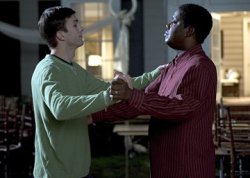Guess Who: Meet the Parents With Black and White People
review by matthew webber

Guess what movieís not as dumb as its trailer?
If youíve seen the trailer for the new Bernie Mac/Ashton Kutcher vehicle Guess Who, or if youíve ever seen a romantic comedy about two mismatched lovers, you know how the movie will end. Ebony and ivory indeed will live in perfect harmony, fueled by manic go-kart races and awkward jokes about color.
On paper, the movie is an update of the award-winning 1967 relic, Guess Whoís Coming to Dinner, with Mac and Kutcher reversing the race of the Spencer Tracy and Sidney Poitier roles for modern-day relevance or some kind of statement about contemporary race relations or something else highly marketable.
On screen, the movie is something else: the latest Hollywood product in a profitable run of mixed-race buddy pairings, from the Taciturn Asian (Jackie Chan) and Motor-Mouthed Black Man (Chris Tucker) pictures, to the Taciturn Asian and Laid-Back Stoner Dude (Owen Wilson) flicks, to the ongoing Ben Stiller and Anonymous Gentile series.
Although Kutcherís white Simon character is engaged to the beautiful black daughter, Theresa (Zoe Saldana, previously seen in the Britney Spears vehicle Crossroads), of Macís Percy Jones, the movieís focal relationship is really that of Simon and Percy; they are the buddies, the mismatched lover characters, straining to overcome not just race but embarrassing first impressions and a healthy distrust of each otherís motivations while winning each otherís affections. Through a series of implausible events that only happen in movies (indoor tackle football, Simon and Percy sharing a bed, people north of the Mason-Dixon line liking NASCAR), both characters come to accept each other as future in-laws, complete with a musical ensemble piece at the end.
Much of the comedy comes from where itís expected: Macís bulging eyeballs versus Kutcherís aw-shucks, broad-shouldered goofiness. (If not exactly charismatic, Kutcher is usually at least likable.) Saldana, too, proves adept at holding attention, and not just because of her flawless skin. Her glowing smile and easy rapport with Kutcher help light up the screen.
Even though the lovers come from different backgrounds (in a further race reversal, Simonís dad is the deadbeat who left his mother, while Percy is a doting, successful father with a lasting marriage and a suburban manse), the sweetly giggling actors make it clear their characters should be together, even when theyíre fighting.
To them, race doesnít matter, and the obvious point of the movie (and the secondary reason for its being made) is that it shouldnít matter to the audience, either. So letís erase the color line by laughing at it; letís share an uncomfortable hilarity; letís lessen or reclaim the sting of racial jokes by telling them and getting them over with (which Simon does, at the dinner table, in one of Guess Whoís funniest but most painful scenes).
The movieís underlying liberal feel-good-ism doesnít negate its desire (and our collective need) to explore the topic of race, an issue that still proves divisive and continues to suffer from a lack of honest discourse in this country. The fact that Guess Who isnít already viewed as an anachronism like its original, from almost 40 years ago, is no laughing matter.
True, the MTV-watching kids who leave the theater wonít be inspired to actually do anything about race relations, but at least theyíll have something to think about in the minutes before they forget this movie. And yes, Guess Who is an imperfect, admittedly facile, comedy, but this makes it no less amusing, and no less worthy of its inevitable sequel, than Meet Ben Stillerís Girlfriendís Differently Cultured Parents.
*
E-mail the author at mattwebber@gmail.com with questions, comments, or suggestions.
Visit www.matthewwebber.net for more writings or information.
Copyright (c) 2005 erasing clouds |
|